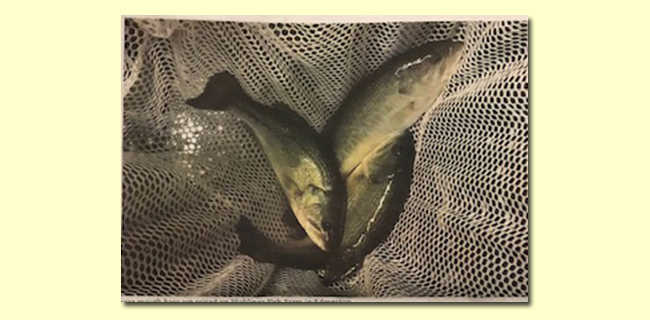
Large-mouth bass.
— Published by NY Farm Bureau (Filed by Kyle Wallach for Grassroots newspaper)
Albany, NY, January 29, 2020 - Aquaculture or aquafarming includes the farming of fish, shellfish as well as aquatic plants and other organisms. When you think of agriculture and farming in New York, aquaculture is not often what comes to mind. However, New York State has an abundance of farmers in the aquaculture industry.
The industry is emerging as one of the fastest growing methods of food production. Jesse Lepak and Michael Ciaramella are Specialists with New York Sea Grant. Lepak works upstate with stakeholders in the industry on sustainable fisheries, stocking regimes, invasive species and fish handling practices. Much of Lepak’s work is focused on challenges in New York State fisheries with an emphasis on Lake Ontario and Lake Erie.
Ciaramella handles downstate aquaculture and works heavily on post-harvest activities such as assisting with federal, state and local food safety regulations. Ciaramella conducts Hazard Analysis Critical Control Point (HACCP) trainings and guides producers through the many regulations. The HACCP trainings he conducts are necessary to ensure food safety, this includes hazard analysis, monitoring procedures, corrective actions and record keeping procedures among other tasks.
I’m currently working with the Seafood HACCP Alliance on developing an aquaculture HACCP course focusing primarily on aquaculture as a supplement course to the original training to ensure proper management and control of safety risks by the processors of farmed seafood,” said Ciaramella.
In any form of farming there are challenges, some of the main challenges facing the aquaculture industry across the state are the high costs of energy and feed, regulations and permit processes, and a lack of access to necessary funding.
Additionally, the different regions experience different challenges.
“The access to space and competition with other users,” said Ciaramella, which is a hurdle faced on Long Island. Many of the yacht and boating clubs oppose the presence of fisheries and have the economic resources to keep them out. Ciaramella believes there is a lack of understanding and awareness with aquaculture that has hindered the industry, stemming from consumers not understanding the diversity and. Complexity of aquaculture which in turn results in generalizations from the commercial groups.
Fortunately, growth in the aquaculture industry is appearing throughout New York. Opportunities surrounding fin fish and oysters are helping advance the industry and keeping these farms in business. One of the major aspects that keep the aquaculture industry successful are the strides that are being taken with regard to feed composition and finding alternative sources to meet the Omega-3 and protein needs for fish feeds. Farms are using a lot of terrestrial plants, seaweeds and insects to replace fish meal and fish oil. These sustainable farming efforts not only help the farms, but the environment as well. There have been many advances in systems looking to take an integrated multitrophic approach. By utilizing various trophic levels, you can minimize or even eliminate any inputs to the environment, even in an open water system.
When asked to provide advice they would give to aquaculture farmers, Lepak and Ciaramella’s responses were focused on relationships and resources. They encourage farmers to take advantage of the growing resources within and outside of the state. They also advise farmers to learn from those who have failed, mentioning that from 2006-2012 New York State lost 10 aquaculture operations. They also suggested to work with university extensions and researchers to better assist with technical issues and guide research efforts to ensure critical issues preventing or limiting growth and production are being addressed.
With so many obstacles facing all forms of farming in New York, it is important to look at industry’s such as aquaculture and learn from their new innovative ways to overcome the threats to their business.
“Aquaculture in New York State is like being a Mets fan, always pessimistic but slightly hopeful,” said Jim Kennedy, a long-time aquaculture farmer.
More Info: New York Sea Grant
New York Sea Grant (NYSG), a cooperative program of Cornell University
and the State University of New York (SUNY), is one of 34 university-based
programs under the National Oceanic and Atmospheric Administration’s
National Sea Grant College Program.
Since 1971, NYSG has represented a statewide network of integrated
research, education and extension services promoting coastal community
economic vitality, environmental sustainability and citizen awareness
and understanding about the State’s marine and Great Lakes resources.
Through NYSG’s efforts, the combined talents of university scientists
and extension specialists help develop and transfer science-based
information to many coastal user groups—businesses and industries,
federal, state and local government decision-makers and agency managers,
educators, the media and the interested public.
The program maintains Great Lakes offices at Cornell University, University at Buffalo, SUNY Oswego and the Wayne County Cooperative Extension office
in Newark. In the State's marine waters, NYSG has offices at Stony Brook
University in Long Island, Brooklyn College and Cornell Cooperative
Extension in NYC and Kingston in the Hudson Valley.
For updates on Sea Grant activities: www.nyseagrant.org has RSS, Facebook, Twitter, Instagram, and YouTube links. NYSG offers a free e-list sign up via www.nyseagrant.org/nycoastlines for its flagship publication, NY Coastlines/Currents, which is published quarterly. Our program also produces an occasional e-newsletter,"NOAA Sea Grant's Social Media Review," via its blog, www.nyseagrant.org/blog.